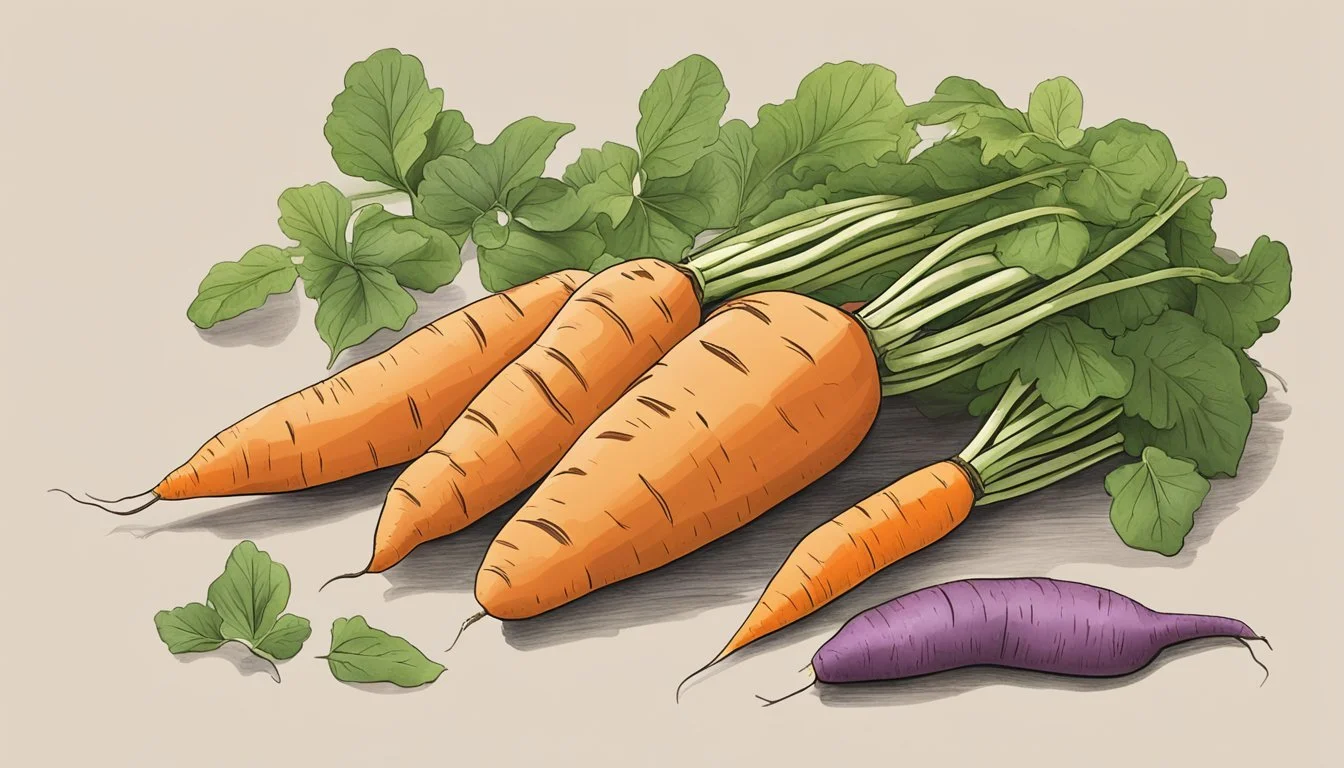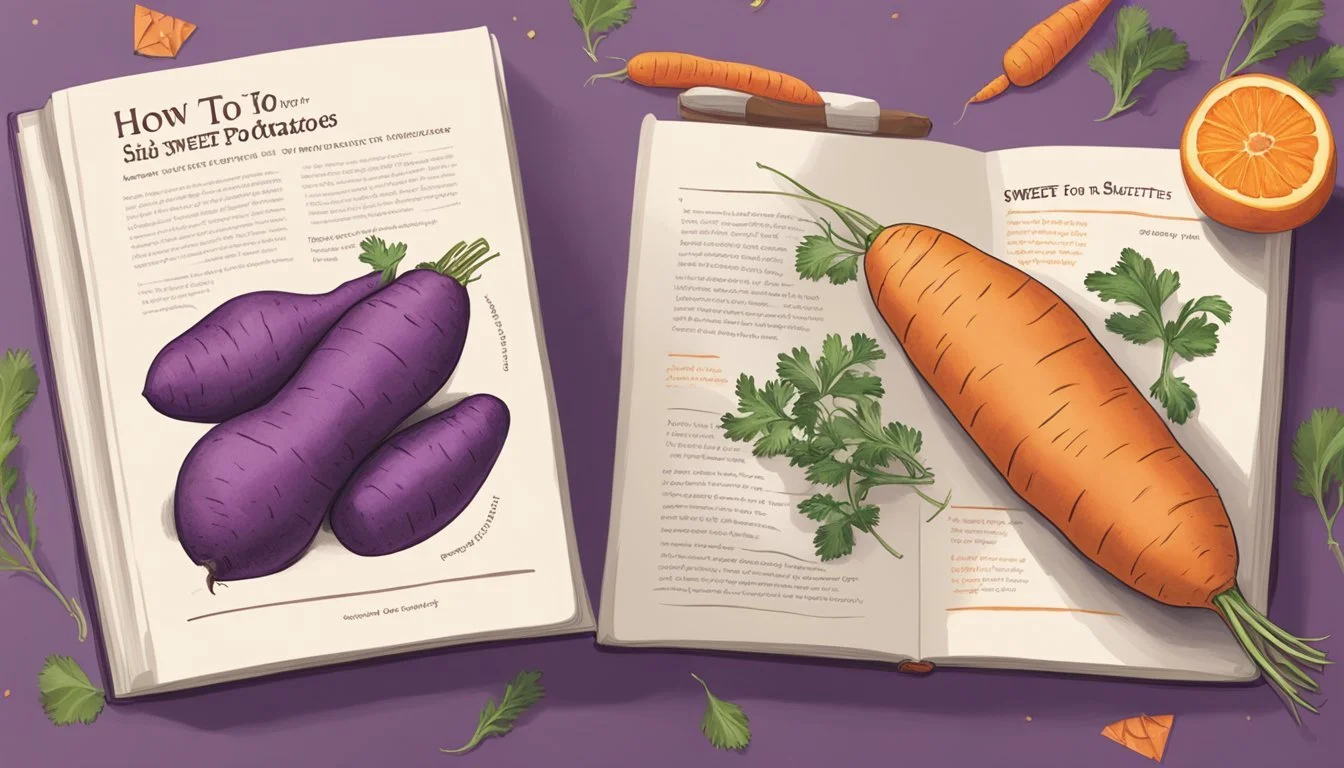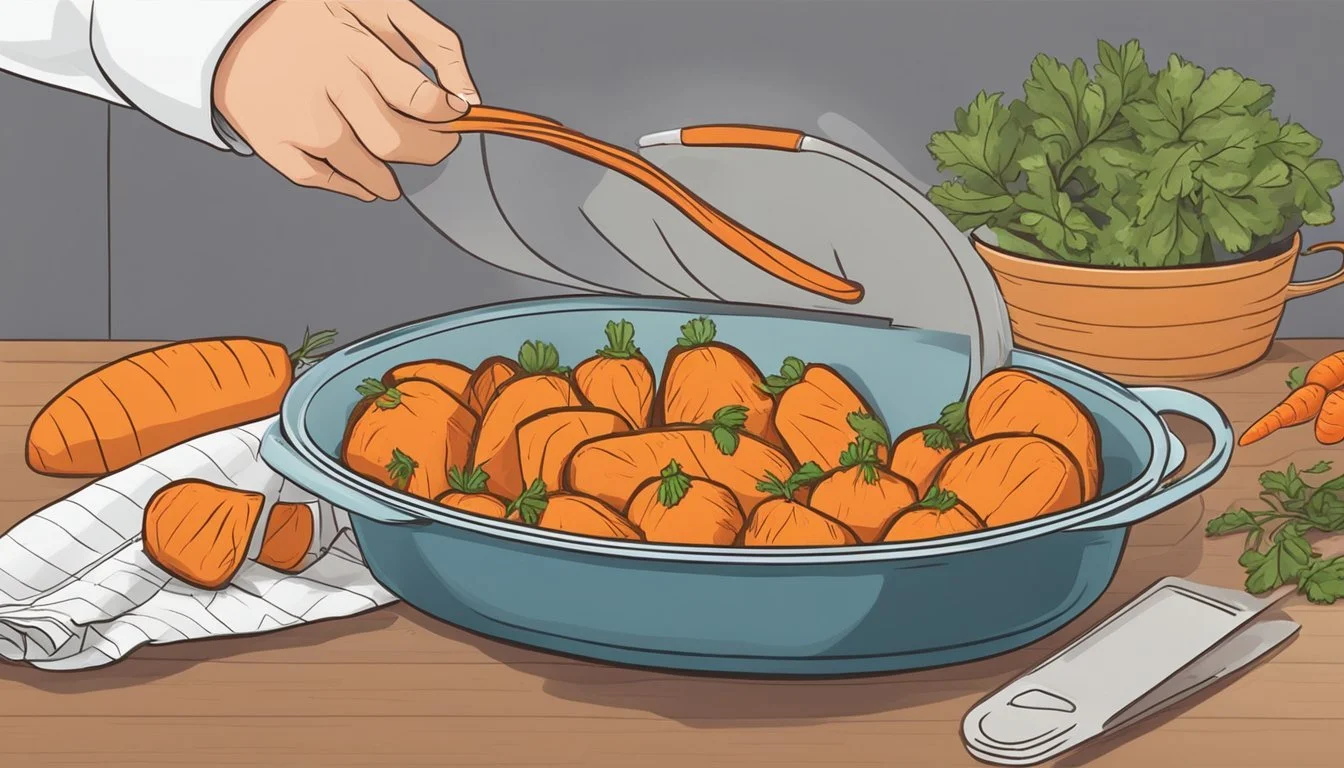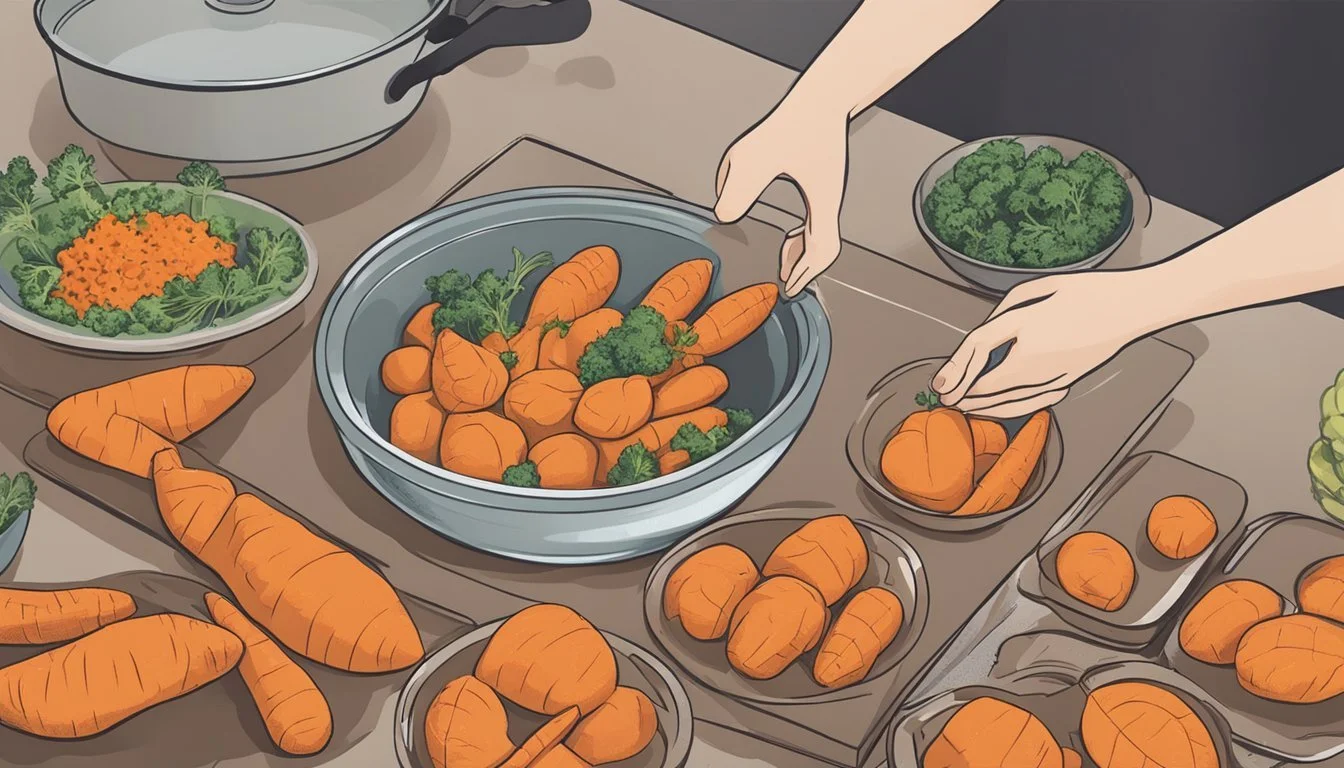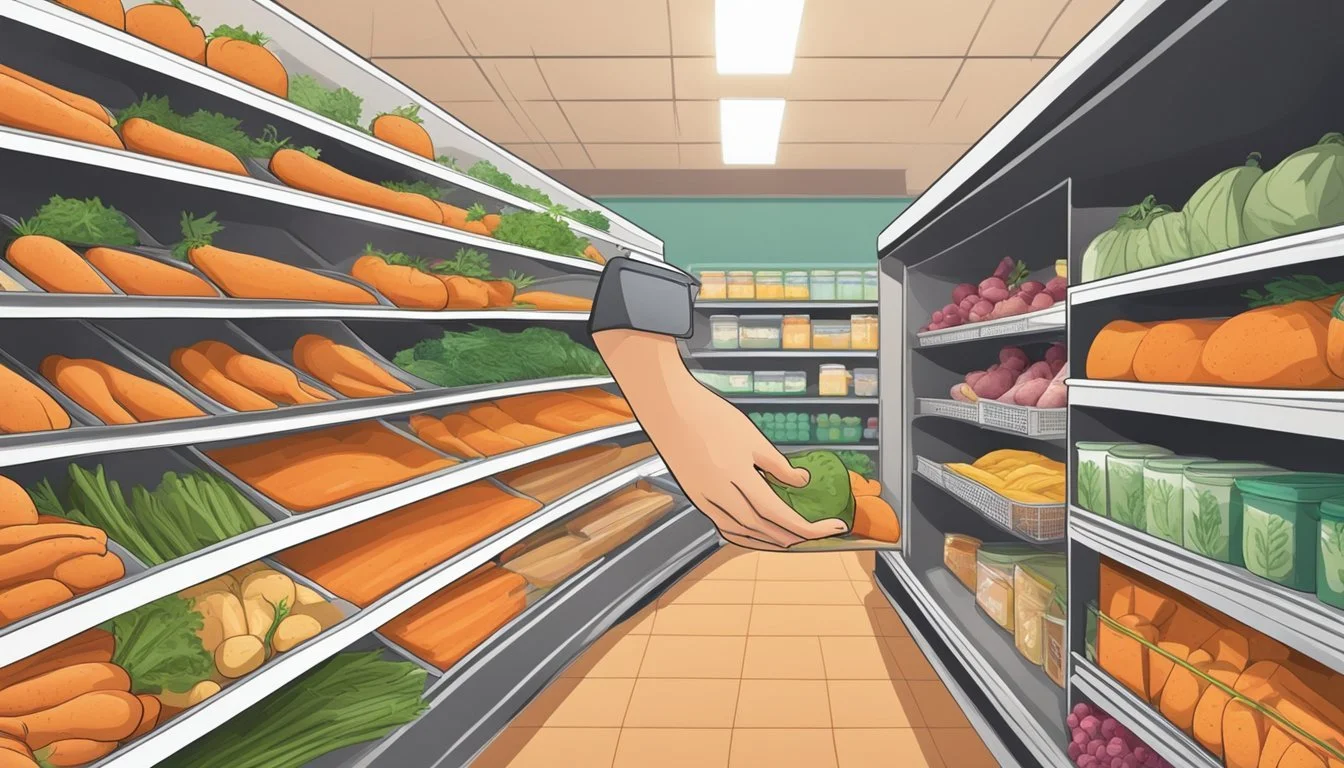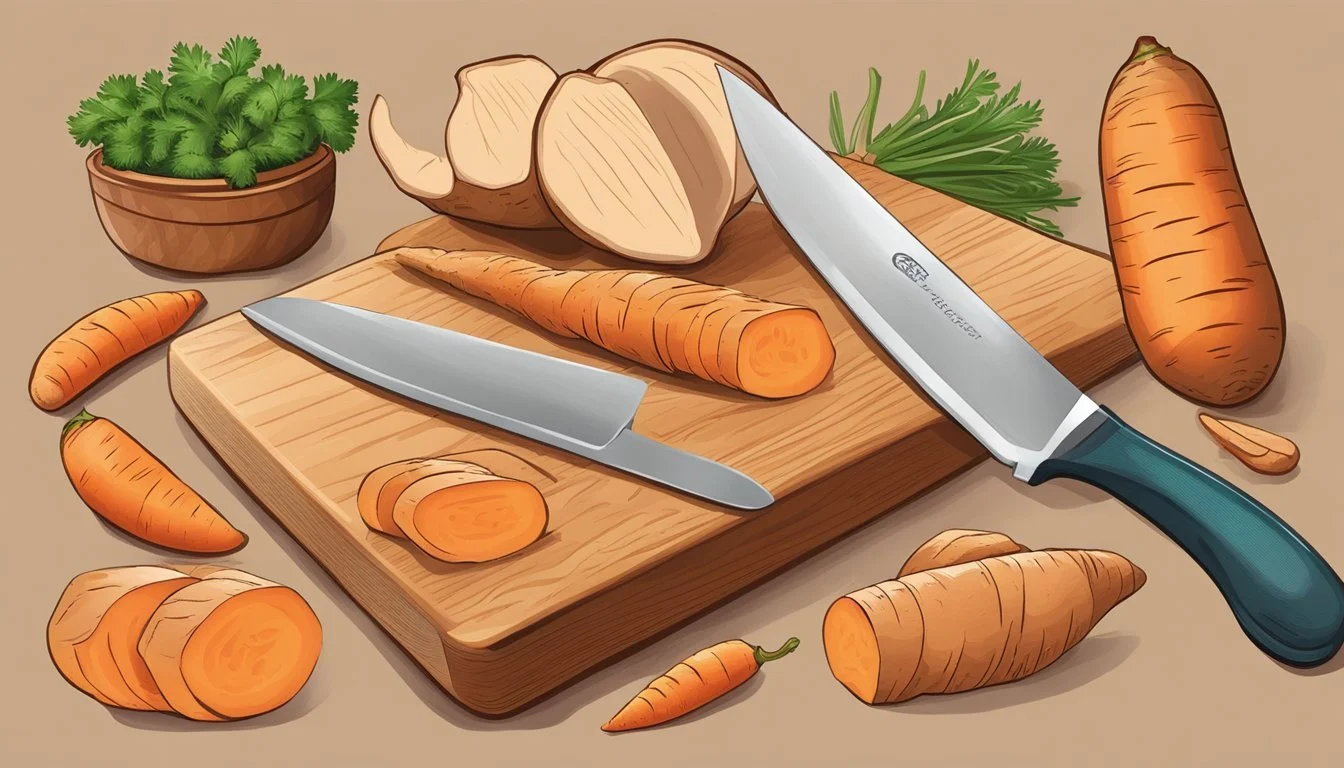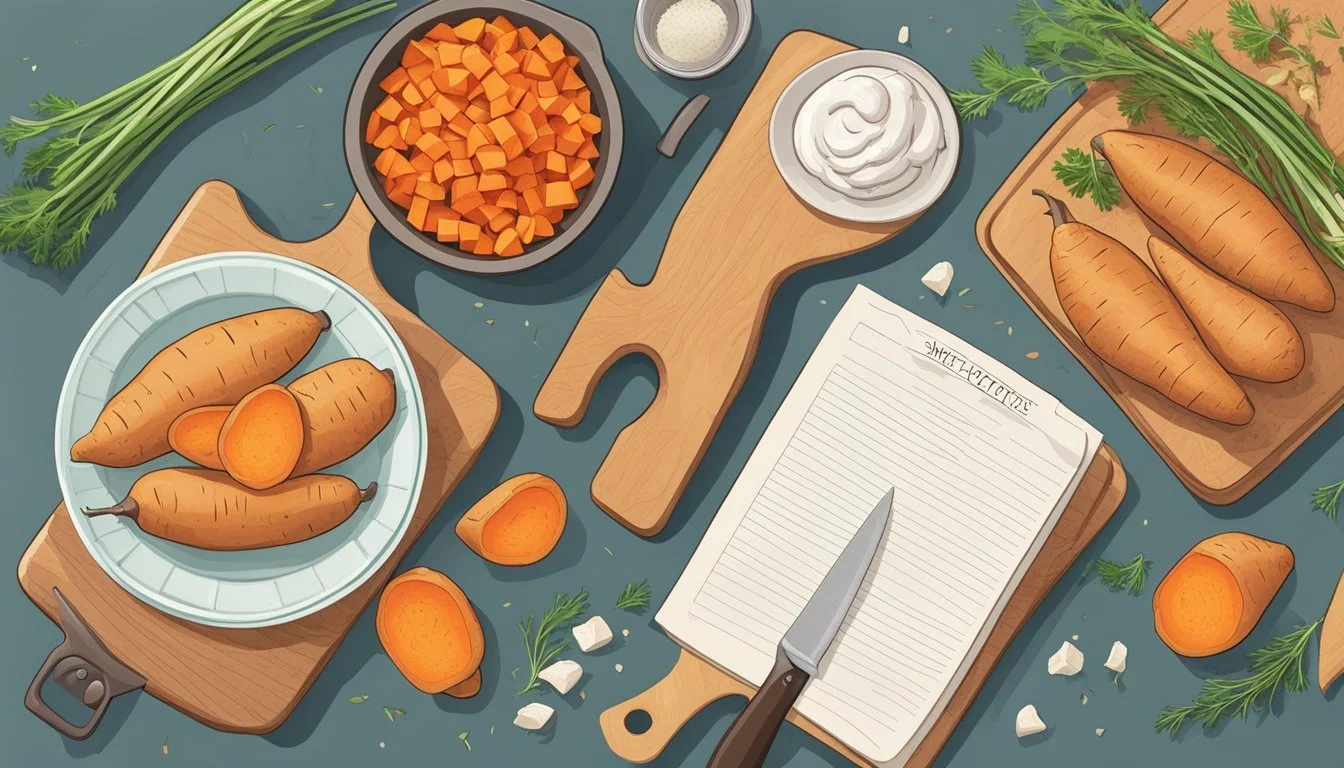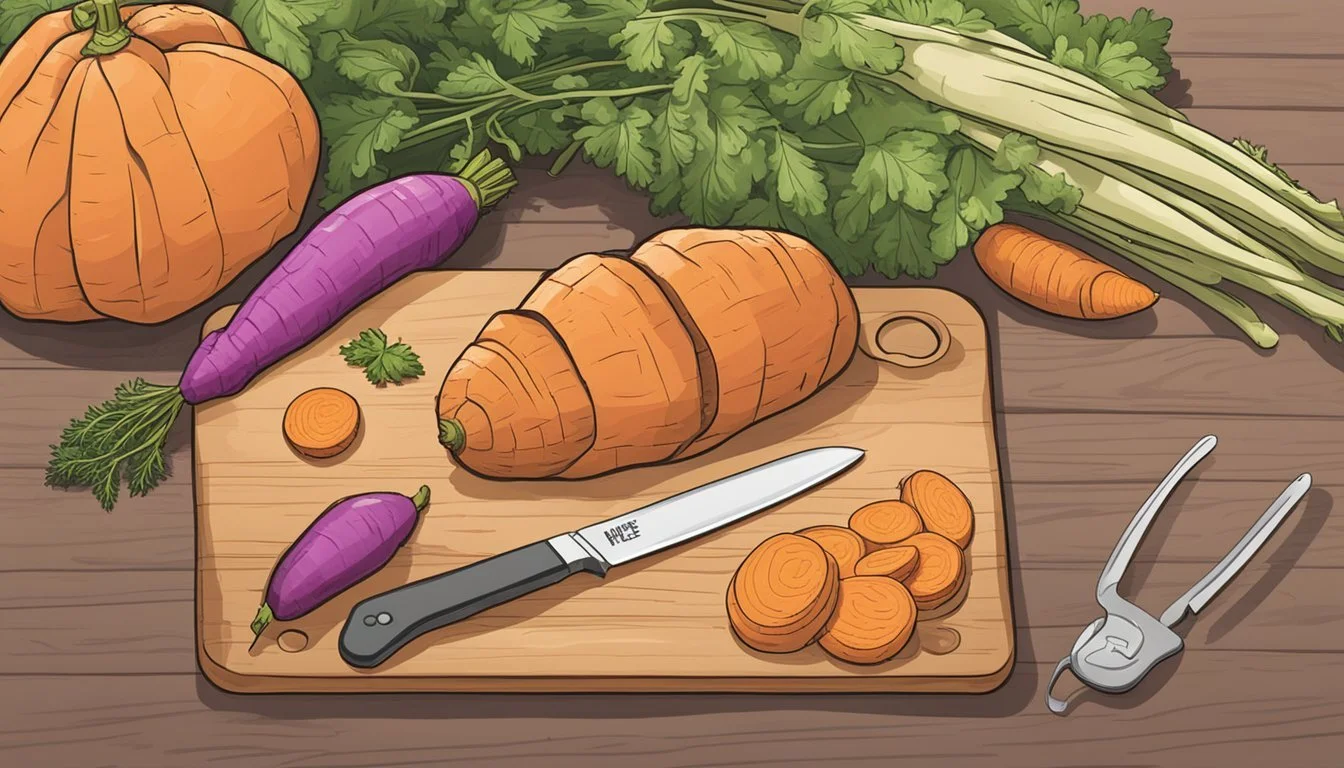How to Substitute Sweet Potatoes for Carrots
A Simple Guide for Home Cooks
Sweet potatoes (What wine goes well with sweet potatoes?) are a popular and nutritious root vegetable known for their sweet flavor and versatility in the kitchen. They're packed with vitamins, minerals, and fiber, making them a healthy addition to any diet. In some recipes, however, one might want to replace sweet potatoes with an alternative that aligns better with the dish's texture or flavor profile, or due to dietary preferences or availability issues.
Carrots emerge as a suitable substitute, with their own set of health benefits and a natural sweetness that can complement the flavors in recipes traditionally calling for sweet potatoes. While the textures of cooked sweet potatoes and carrots differ, carrots can be prepared in a way that makes them a plausible stand-in. They can be roasted, boiled, or steamed to achieve a softness similar to that of sweet potatoes, while also adding a subtle, earthy nuance to dishes.
It is important to be aware of the textural differences between the two vegetables. Carrots, when cooked, offer a firmer texture compared to the creamy consistency of sweet potatoes. This should be considered when using carrots as a substitute, especially in recipes where the texture of sweet potatoes is a defining characteristic. With thoughtful preparation, carrots can be incorporated into a wide array of dishes, providing both flavor and nutritional value.
Understanding Sweet Potatoes and Carrots
In cooking, sweet potatoes and carrots can sometimes be interchanged. This section delves into their nutrition, taste, and texture, offering insights into how these root vegetables compare and contrast.
Nutritional Comparison
Sweet potatoes and carrots both offer considerable nutritional benefits, yet they differ in their vitamin and mineral content. Sweet potatoes are an excellent source of vitamin A and vitamins C and B6, while carrots provide a high amount of vitamin A and are also a good source of several other vitamins and minerals, such as vitamin K and potassium. Below is a table comparing the nutritional content of sweet potatoes and carrots per 100 grams:
Nutrient Sweet Potatoes Carrots Calories (kcal) 86 41 Fiber (g) 3.3 2.8 Vitamin A (IU) 14187 16706 Vitamin C (mg) 2.4 5.9 Potassium (mg) 337 320
Flavor Profiles
The flavor profile of sweet potatoes is sweet and starchy with a hint of nuttiness. On the other hand, carrots have a naturally sweet flavor with earthy undertones. When cooked, both vegetables' sweetness is amplified, although sweet potatoes generally exhibit a more pronounced and richer sweetness.
Texture and Consistency
Sweet potatoes and carrots differ in texture, both in their raw and cooked states. Raw sweet potatoes are quite hard and dense, needing to be cooked to become palatable. Carrots are also firm when raw but can be eaten without cooking. Once cooked, sweet potatoes become soft and creamy, ideal for mashing. Carrots too become tender but retain a slight firmness that provides a crisp bite. In dishes where texture is crucial, this difference should be taken into account.
Substituting in Recipes
When replacing sweet potatoes with carrots in recipes, it's important to consider the sweetness variation, how baking affects texture, and the necessary adjustments to cooking times.
Adjustments for Sweetness
Carrots possess a natural sweetness, but it is more subtle compared to the robust sweet flavor of sweet potatoes. In savory dishes, this difference is typically negligible; however, for sweeter recipes, one might need to add a slight amount of sugar or honey to match the sweetness level of sweet potatoes. Conversely, when sweet potatoes are used as a substitute for carrots, reducing added sweeteners can balance the taste.
In Savory Cooking: Use carrots directly with no additional adjustments.
In Sweet Cooking: Add a touch of sugar or honey, starting with a teaspoon and adjusting to taste.
Substitutions in Baking
The texture of baked goods can vary when substituting carrots for sweet potatoes due to their different moisture content and texture.
Cakes and Breads: Carrots may result in a firmer texture. For a closer match to sweet potatoes, puree the carrots to ensure even moisture distribution.
Pies and Pastries: Sweet potatoes offer a creamier texture for fillings. To replicate this, blend carrots thoroughly and consider adding a binding agent, such as a tablespoon of cornstarch, to achieve a similar consistency.
Modifications for Cooking Time
Carrots and sweet potatoes differ significantly in cooking times due to their densities. Carrots typically cook faster than sweet potatoes, so adjustments should be made to prevent overcooking when carrots are used as a substitute in a recipe initially designed for sweet potatoes.
Roasting: Carrots may require less time in the oven; start checking for doneness 10-15 minutes earlier than the recipe for sweet potatoes suggests.
Boiling: Carrots become tender more quickly. Begin taste-testing for desired tenderness roughly 5-7 minutes before the sweet potatoes' expected cooking time would conclude.
Alternative Substitutes
When looking to replace sweet potatoes in a recipe, one has a bounty of options, particularly among root vegetables and squash varieties. These alternatives not only mimic the texture and sweetness of sweet potatoes but also contribute their unique flavors and nutritional profiles to dishes.
Root Vegetable Options
Root vegetables are a natural substitute for sweet potatoes due to their starchy composition and ability to become tender when cooked. They are typically rich in fiber, vitamins, and minerals.
Parsnips: A close relative of carrots, parsnips have a sweet, nutty flavor and can be used in most recipes calling for sweet potatoes. They are particularly high in potassium.
Beets: While beets have a distinctly earthy taste, they add a vibrant color and are nutritionally dense, excellent in baked or roasted dishes.
Rutabaga: This cross between a turnip and a cabbage is milder and sweeter, which can be boiled, mashed, or roasted.
Celery Root (Celeriac): With its knobby exterior, celery root may not be as sweet, but it offers a unique flavor reminiscent of celery stalks and is quite versatile.
Turnips: These can bring a slightly spicy undertone to a dish while mimicking the texture of sweet potatoes when cooked.
Squash Varieties
Squash can be an ideal stand-in for sweet potatoes due to their similar texture and natural sweetness, often improving with the intensity of the cooking process.
Butternut Squash: Its creamy texture and sweet taste make it a substitute that is easy to mash, roast, or turn into soups.
Acorn Squash: Its flesh softens and sweetens when roasted, suitable for both savory and sweet applications.
Japanese Pumpkin (Kabocha): It takes on a texture and sweetness similar to a sweet potato when cooked, excellent for soups, purees, and baked recipes.
Pumpkin: A classic fall staple, pumpkin can be mashed, roasted or used in baking, with a soft texture and sweet flavor profile.
Zucchini: Although not as sweet, zucchini can be used in sweet potato dishes for a lighter, more delicate texture and is particularly good when moisture content is considered in recipes.
Specific Dish Adaptations
When substituting sweet potatoes with carrots, one should consider the texture and sweetness differences to ensure that the final dish maintains a balanced flavor and desirable consistency. Specific adaptations can enhance the outcome in savory dishes, sweet dishes, and salads and side dishes.
Savory Dishes
In recipes like soups and stews, carrots can seamlessly replace sweet potatoes, particularly garnet or Japanese varieties, due to their similar firmness. However, they may require a longer cooking time to achieve the desired softness. It's recommended to add carrots earlier in the cooking process to account for this difference.
Mashed Potatoes: To mimic the creamy texture of mashed sweet potatoes, cook the carrots until they are tender, then mash thoroughly. A touch of nutmeg can complement the natural sweetness of carrots.
Stews: For stews, carrots should be cut into hearty chunks. They may not break down as much as sweet potatoes, so consider pureeing a portion for a thicker consistency if desired.
Sweet Dishes
Carrots can be a carrot substitute in sweet dishes, but the cook should address the variance in natural sugars. One might need to adjust the level of sweeteners included in the recipe.
Baked Goods: Carrots can be finely grated and used in place of sweet potatoes in baked goods such as bread, muffins, or cakes. Carrots can add moisture and a subtle sweetness to these dishes.
Salads and Side Dishes
Carrots provide a crunchy and colorful addition to salads and side dishes where sweet potatoes may be used for a softer texture.
Salads: Julienned or grated carrots offer a refreshing crunch and are an excellent sweet potato substitute in most salad recipes.
Side Dishes: Roasted carrot chunks, seasoned minimally with salt, pepper, and a drizzle of olive oil, can stand in for sweet potatoes as a side dish, bringing a different, but equally enjoyable, flavor profile.
Health Considerations
When substituting sweet potatoes with carrots, individuals should consider the health benefits and nutritional contents of both vegetables. Carrots are a low-calorie alternative, beneficial for those monitoring their caloric intake. They are also lower in carbohydrates, making them a preferable choice for low-carb diets compared to the higher carb content in sweet potatoes.
Nutrient Comparison (per 100g):
Nutrient Sweet Potatoes Carrots Calories 86 41 Carbohydrates 20.1g 9.6g Fiber 3g 2.8g Vitamin C 2.4mg 5.9mg Potassium 337mg 320mg
Both sweet potatoes and carrots are good sources of dietary fiber, which promotes digestive health. However, carrots provide a slightly more concentrated source of vitamin C—an essential nutrient known for its antioxidant properties and role in immune function. In terms of potassium, the numbers are comparable, with sweet potatoes having a marginally higher content. Potassium is vital for maintaining healthy blood pressure levels and proper cellular function.
Individuals with specific health concerns should consult with healthcare professionals before making dietary changes. The inclusion of both carrots and sweet potatoes can contribute to a balanced diet, offering a spectrum of vitamins, minerals, and other nutrients essential for maintaining good health.
Culinary Techniques and Tips
To successfully use sweet potatoes as a substitute for carrots, one needs to consider preparation method, seasoning adjustments, and presentation to ensure a delightful dish that pleases both the palate and the eye.
Preparing the Substitutes
When replacing carrots with sweet potatoes, one should first peel and cut the sweet potatoes into shapes that mimic the size and thickness of carrot cuts. This ensures uniform cooking times. They should lightly coat them in olive oil to promote an even caramelization and sublime texture.
Seasoning to Taste
Sweet potatoes possess a natural sweetness that is more pronounced than that of carrots. Hence, the cook may need to adjust seasonings. It is recommended to start with a base of salt and black pepper, then taste and adjust accordingly. For added depth, one might consider a touch of garlic powder or minced garlic, complementing the sweet potatoes' rich, earthy flavor.
Presentation and Garnishing
The visual appeal is crucial; sweet potatoes offer a vibrant purple color when using the purple variety, adding a striking element to the dish’s appearance. To garnish, a sprinkle of fresh herbs or a drizzle of olive oil before serving can enhance both the look and taste, presenting a visually appealing plate that is full of flavor.
Exploring Global Cuisine
Sweet potatoes offer a versatile range of flavors and can be substituted for carrots across various global cuisines. From the starch-rich taro in Asian dishes to the hearty cassava root found in South American recipes, a variety of alternatives to carrots can be found.
Asian Influences
In Asian cuisine, sweet potatoes can be replaced with ingredients such as Japanese sweet potatoes and taro. These are particularly prominent in East and Southeast Asia. For instance:
Japanese sweet potatoes: Boasting a chestnut flavor, they make a fabulous addition to tempura dishes or desserts.
Taro: This starchy root is often used in curries and desserts and can provide a similar density and sweetness to that of sweet potatoes.
South American Flavors
In South America, cassava, also known as yuca, is a common alternative. It's often prepared in a manner similar to potatoes and works well in recipes requiring the heft of sweet potatoes. For example:
Boiled or fried, cassava is a staple in dishes like cassava fries or pan de yuca, a type of bread.
European Dishes
Europe offers a mix, where root vegetables like daikon radish and eggplant might be used as a creative substitute for sweet potatoes, ideal in a range of savory dishes:
Daikon radish: While less sweet, its crisp texture is excellent for pickling or roasting.
Eggplant: With a meaty texture, eggplant can replace sweet potatoes in stews or ratatouille.
Shopping and Storage
When substituting sweet potatoes with carrots, the shopper should consider the type of dish and desired texture, as well as proper storage methods to maintain the carrot's freshness and flavor.
Selecting the Right Type
White Potatoes: A suitable replacement for sweet potatoes, they offer a creamy texture when cooked. Choose Russet potatoes for mashing, Yukon Gold potatoes for a buttery flavor, and white potatoes for general use.
Russets: Ideal for baking and frying due to their starchy texture.
Yukon Golds: Their natural sweetness and moist texture work well in soups and stews.
White Potatoes: A versatile choice that adapts well to various cooking methods.
Additionally, Jewel potatoes and golden beets can be considered for their sweet, nutty flavors that come close to sweet potatoes.
Storing for Freshness
Carrots, as a substitute for sweet potatoes, require proper storage to extend their shelf life:
Carrots: Store them in the coolest part of the refrigerator, ideally in a perforated plastic bag to allow airflow. They can last for several weeks if kept away from fruits that produce ethylene gas, which accelerates spoiling.
Potatoes:
Keep dry and cool: A dark, cool, and well-ventilated area prevents sprouting and rotting. Avoid refrigeration, as it can alter the flavor.
Separate: Store potatoes away from onions to prevent mutual spoilage.
Inspect regularly: Remove any sprouting or soft potatoes to protect the rest.
By selecting the appropriate type of potato or alternative like golden beets for the desired sweet potato recipe and following best practices for storage, the ingredients will remain fresh, delivering the intended outcome in flavor and texture.
The Science of Taste and Texture
When substituting sweet potatoes with carrots, understanding the science behind taste and texture is crucial. Sweet potatoes are known for their soft, creamy interior when cooked, combined with a subtle sweetness and rich flavor profile. Carrots, although typically firmer, can achieve a similar consistency and offer their own natural sweetness.
Characteristic Sweet Potato Carrot Texture (Raw) Firm Crisp, rigid Texture (Cooked) Soft, creamy Softens appreciably Taste (Raw) Mild, sweet Slightly sweet, earthy Taste (Cooked) Enhanced sweetness Enhanced sweetness, hints of nuttiness
The goal in substitution is to match the texture and consistency as closely as possible. One can achieve this by manipulating the cooking time and methods. Roasting or boiling carrots until they are tender ensures they closely mimic the creamy feel of a prepared sweet potato, suitable for a variety of dishes.
In terms of taste, while carrots possess a more neutral taste compared to the robust flavor of sweet potatoes, their subtle sweetness is emphasized through caramelization during roasting or richness when pureed. Proper seasoning can further help in aligning the flavor profiles.
Thus, the science of taste and texture informs the process of substitution. Carrots are a versatile choice that maintains nutritional value and can commendably stand in for sweet potatoes with the right preparation.
Conclusion
When one needs to substitute sweet potatoes for carrots, several alternatives come to light, each lending unique attributes to a dish. Plantains are a hearty substitution, holding their structure well in cooking, much like sweet potatoes. They can be a superior choice for recipes requiring a starchy component with a subtle sweetness.
For traditional potato recipes, consider options such as red potatoes or yams. Red potatoes provide a smooth and creamy texture with a mildly sweet flavor, while yams match the sweetness and texture of sweet potatoes, making them a near-perfect stand-in.
In terms of flavor and crunch, celery stands out as a non-starchy variant with a distinctive taste, infusing dishes with a fresh element. Cabbage and celeriac also present viable solutions, offering a blend of subtle sweetness and robustness that complements many meals without overpowering other ingredients.
For umami depth akin to what carrots offer, mushrooms are an ideal choice. Their earthy tones and savoriness enrich any culinary creation, especially sauces or stews.
Here is a quick guide to suitable carrot substitutes:
Substitute Best used in Notes Plantains Savory & sweet dishes Holds structure, mildly sweet Red Potatoes Hearty meals Creamy texture, minimal sweetness Yams Sweet dishes Texture and sweetness close to carrot Celery Salads, stews Adds crunch and fresh taste Cabbage Slaws, stir-fries Subtle sweetness, variety of textures Celeriac Roasted dishes Earthy, sweet with a robust flavor Mushrooms Umami-rich dishes Excellent for depth of flavor
This concise array should assist cooks in finding the right substitution to achieve the desired flavor and texture profile when sweet potatoes replace carrots in a dish. The options are numerous and flexible, allowing adjustments based on individual preferences and recipe requirements.
Supplementary Information
This section provides targeted insights for home cooks seeking practical advice on substituting sweet potatoes with carrots, including a brief FAQ and a list of curated resources.
FAQ on Sweet Potato and Carrot Substitutions
How do the flavors of sweet potatoes and carrots compare? Sweet potatoes have a creamy and sweet flavor profile with earthy undertones. Carrots also possess a natural sweetness and a crisp texture that softens upon cooking, making them a suitable alternative in recipes calling for sweet potatoes.
What are the nutritional differences? Sweet potatoes are rich in vitamin A, vitamin C, and fiber, whereas carrots offer a high amount of vitamin A, fiber, and antioxidants.
Can carrots and sweet potatoes be used interchangeably? Yes, they can be substituted for each other in many dishes, although adjustments in cooking times and seasoning may be necessary due to texture and flavor differences.
Resource List for Home Cooks
Substitution Guides:
Substitute Cooking: Offers a comprehensive guide on various substitutes, including sweet potatoes.
Foods Guy: Provides insights on how different vegetables can replace sweet potatoes in recipes.
Recipe Databases:
Allrecipes: Contains an extensive collection of recipes with user-submitted substitution ideas.
Epicurious: Features chef-curated recipes that are adaptable for sweet potato substitutions.
Nutritional Information:
USDA FoodData Central: Reliable source for detailed nutritional information on both carrots and sweet potatoes.
MyFitnessPal: A tool for tracking dietary intake, including the nutritional content of carrots and sweet potatoes.

